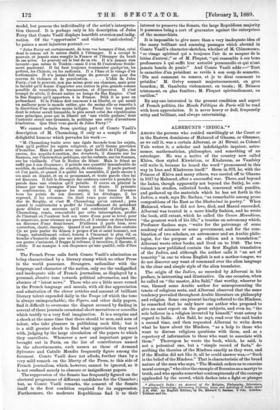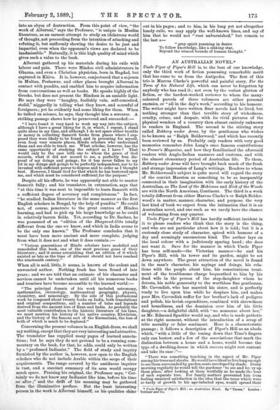ALBERUNI'S " INDICA."*
AMONG the persons who resided unwillingly at the Court or in the Eastern dominions of Mahmud of Ghazna, or Ghuznee, as we call it, was a certain Alberuni, or Al Biruni, as Colonel Yule writes it, a scholar and indefatigable inquirer, astro- nomer, mathematician, philosopher, and something of an astrologer. He was a native of the country now called Khiva, then styled Khwirizm, or Khahrezm, as Vambery will write it, because he heard the word "pronounced in this way in Iran and Khahrezm itself." Born in 973, he, with the Princes of Khiva and many others, was carried of to Ghazna in 1017 by Mahmud, after a successful war. There, and beyond the Indus, though apparently not beyond the Sutkj, he con- tinued his studies, collected books, conversed with pundits, and gathered up the materials which he has set forth in the Indica, a work, says Dr. Sachau, "as remarkable among prose compositions of the East as the Sh,ahnairait in poetry." When Mahmud, whom he did not love, died, and Masud succeeded, Alberuni was treated in a more kindly fashion, and he wrote the book, still extant, which he called the Canon Masudicus, "the greatest work of his life," a treatise on astronomy which, Professor Sachau says, "waits for the patronage of some academy of sciences or some government, and for the com- bination of two scholars, an astronomer and an Arabic philo- logist, for the purpose of an edition and a translation." Alberuni wrote other books, and lived on to 1048. The two volumes now published contain the first English translation of the Indica, and although the author calls it "an act of temerity" in one to whom English is not a mother-tongue, we do not discover any want of command over the alien language in the clear and simple style of the alien translator.
The origin of the Indica, as recorded by Alberuni in his preface, is interesting and illustrative. On one occasion, when he called on "the master, Abu Sahl," that worthy, whoever he was, blamed some Arabic author for misrepresenting the tenets of religious sects, and Alberuni observed that the same tendency prevailed throughout Arabic literature on philosophy and religion. Some one present having referred to the Hindoos, he remarked that he only knew one author who proposed to give an exact report on the great subjects, and even he, "the sole believer in a religion invented by himself," went astray in regard to India. Abu Sall, he says, read over the said books a second time, and then requested Alberuni to write down what he knew about the Hindoos, "as a help to those who want to discuss religious questions with them, and as a repertory of information to those who want to associate with them." Thereupon he wrote the book, which, he said, is not a polemical one, but a "simple record of facts," de- scribing the theories of the Hindoos exactly as they were, and if the Muslim did not like it, all he could answer was,—" Such is the belief of the Hindoos." That is characteristic of the broad nature of the man who says, "The Messiah orders us to exercise moral courage," who cites the example of Socrates as a martyr to truth, and who speaks somewhat contemptuously of the courage applauded by the crowd, which dashes into a fight or plunges
• Albennii's India an Account of the Religion, Philosophy, Literatwre, Geography, Citron° , Astronomy, Customs, Laws, and Astrology of India, about A.D. 1030. An English Edition, by Dr. Edward C. Sachem. 2 Yoh London : TrObner and Co.
into an abyss of destruction. From this point of view, "the work of Alberuni," says the Professor, "is unique in Muslim literature, as an earnest attempt to study an idolatrous world of thought, not proceeding from the intention of attacking and refuting it, but uniformly showing the desire to be just and impartial, even when the opponent's views are declared to be inadmissible." Naturally, it is this high quality of mind which gives such a value to the book.
Alberuni gathered up his materials during his exile with labour and pain. There were Hindoo civil administrators in Ghazna, and even a Christian physician, born in Bagdad, but captured in Khiva. It is, however, conjectured that a sojourn in Multa,n, Peshavrur, and other places brought Alberuni in contact with pundits, and enabled him to acquire information from conversations as well as books. He speaks highly of the Greeks, but does not present the Hindoos in an amiable light.
He says they were "haughty, foolishly vain, self-conceited, stolid," niggardly in telling what they knew, and scornful of foreigners ; yet he evidently had some liking for them. When he talked on science, he says, they thought him a sorcerer. A striking passage shows how he persevered and succeeded :—
"I have found it very hard to work my way into the subject, although I have a great liking for it, in which, I repeat, I stand quite alone in my time, and although I do not spare either trouble or money in collecting Sanscrit books from places where I sup- posed they were likely to be found, and in procuring for myself, even from very remote places, Hindu scholars who understand them and are able to teach me. What scholar, however, has the same opportunity of studying the subject as I have ? That would only be the case with one to whom the grace of God accords, what it did not accord to me, a perfectly free dis- posal of my doings and goings; for it has never fallen to my lot in my doings and goings to be perfectly independent, nor to be invested with sufficient power to dispose and to order as I thought best. However, I thank God for that which he has bestowed upon me, and which must be considered sufficient for the purpose."
Despite all his efforts, he was apparently not able to master Sanscrit fully; and his translator, in extenuation, says that "at this time it was next to impossible to learn Sanscrit with
a sufficient degree of accuracy and completeness." In fact, "he studied Indian literature in the same manner as the first English scholars in Bengal, by the help of pundits." He could not, of course, penetrate to the great centres of Hindoo learning, and had to pick up his large knowledge as he could in relatively barren fields. Yet, according to Dr. Sachau, he was possessed of an "edition of the Bhagavad-Gita totally different from the one we know, and which in India seems to be the only one known." The Professor concludes that it must have been more ancient and more complete, judging from what it does not and what it does contain :—
" Various generations of Hindu scholars have modelled and remodelled this book, one of the most precious gems of their literature; and it seems astonishing that an edition of it which existed as late as the time of Alberuni should not have reached the nineteenth century."
When all is said, little, it seems, is known of the ardent and unwearied author. Nothing fresh has been found of late
years ; and we are told that an estimate of his character and services cannot be undertaken until all his numerous books and treatises have become accessible to the learned world :—
" The principal domain of his work included astronomy, mathematics, chronology, mathematical geography, physics, chemistry, and mineralogy. By the side of this professional work he composed about twenty books on India, both translations and original compositions, and a number of tales and legends derived from the ancient lore of Fran and India. As probably the most valuable contribution to the historic literature of his time, we must mention his history of his native country, Khwilrizm, and the history of the famous sect of the Karmatians, the loss of both of which is much to be deplored."
Concerning the present volumes in an English dress, we shall say nothing, except that they are very interesting and attractive. The translator has supplied many pages of learned annota- tions; but he says they do not pretend to be a running com- mentary on the book, for that, he adds, could only be written by a "professed Indianist." The field of study and inquiry furnished by the author is, however, now open to the English scholars who do not include Arabic within the scope of their acquirements. The range covered by the assiduous inquirer is vast, and a succinct summary of its area would occupy much space. Praising his original, the Professor says, "Cer- tainly we do not know any Indianist like him, before his time or after ;" and the drift of his meaning may be gathered from the illuminative preface. Not the least interesting person in the work is Alberuni himself, as his qualities shine out in his pages ; and to him, in his long yet not altogether lonely exile, we may apply the well-known lines, and say of him that he would not "rust unburnished," but remain to the last a- " grey spirit yearning in desire To follow knowledge, like a sinking star, Beyond the utmost bounds of human thought."



































 Previous page
Previous page